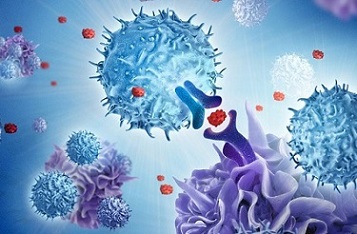COVID-19 Immunology: Brazilian Study Discovers That SARS-CoV-2 Infections Significantly Disrupts T Cell Maturation!
COVID-19 Immunology - SARS-CoV-2 Disrupts T Cell Maturation Mar 05, 2023 2 years, 1 month, 2 weeks, 5 days, 23 hours, 18 minutes ago
COVID-19 Immunology: A new study by researchers from Federal University of Santa Catarina, Florianópolis – Brazil has found that that SARS-CoV-2 infections significantly disrupts T cell maturation!

The COVID-19 disease is a respiratory tract infection caused by the new coronavirus SARS-CoV-2. An adequate T-cell response is essential not only for fighting disease but also for creation of immune memory.
The
COVID-19 Immunology study was conducted to evaluate the T cells of patients with moderate, severe, and critical COVID-19 not only at the time of illness but also two months after diagnosis to observe whether changes in this compartment persist.
A total of 166 COVID-19 patients were stratified into moderate/severe and critical disease categories. The maturation and activation of T cells were evaluated through flow cytometry. In addition, Treg cells were analyzed.
The study findings showed that until 15 days after diagnosis, patients presented a reduction in absolute and relative T lymphocyte counts.
However, after two months, in moderate/severe patients, the counts returned to a similar level as that of the control group. In convalescent patients who had a critical illness, absolute T lymphocyte values increased considerably.
Interestingly, patients with active disease did not show differentiation of T cells. Nonetheless, after two months, patients with critical COVID-19 showed a significant increase in CD4+ EMRA (CD45RA+ effector memory) T lymphocytes.
Importantly, COVID-19 patients showed delayed T cell activation and reduced CD8+ suppressor T cells even two months after diagnosis. A reduction in CD4+ Treg cells was also observed, and their numbers returned to a similar level as that of healthy controls in convalescent patients.
The study findings demonstrate that COVID-19 patients have a delayed activation and differentiation of T cells. In addition, these patients have a great reduction of T cells with a suppressor phenotype.
The study findings were published in the peer reviewed journal: Immunology.
https://onlinelibrary.wiley.com/doi/epdf/10.1111/imm.13635
The current ongoing COVID-19 pandemic has disrupted the lives of individuals worldwide, causing significant health and economic consequences.
The SARS-CoV-2 coronavirus is the causative pathogen responsible for the COVID-19 disease, which mainly affects the respiratory system, leading to severe pneumonia in some cases.
Although most individuals recover from COVID-19, some may experience long-term health effects, including lung damage, heart problems, and cognitive impairment. In addition, emerging evidence suggests that SARS-CoV-2 infection may affect the immune system and cause a delay in the maturation of certain immune ce
lls.
This study explored the impact of SARS-CoV-2 infection on the maturation of T cells, a critical component of the immune system.
T cells are responsible for recognizing and killing infected cells, and their maturation is crucial for developing immunity against viral infections. The study aimed to investigate whether SARS-CoV-2 infection could affect the development of T cells and the long-term immune response to the virus.
The study team analyzed blood samples from 39 COVID-19 patients, ranging from mild to severe disease, and 10 healthy controls.
The researchers measured the frequency and phenotype of T cells and assessed their functional capacity.
The study findings showed that COVID-19 patients had significantly lower levels of mature T cells compared to healthy controls. Specifically, the patients had a reduced frequency of CD8+ T cells, which are responsible for killing infected cells, and an increase in immature T cells.
Moreover, the study team found that the maturation of T cells in COVID-19 patients was delayed compared to healthy controls. They observed that the patients had a higher frequency of CD27+CD45RA+ T cells, which are early-stage T cells, and a lower frequency of CD27-CD45RA+ T cells, which are mature T cells.
The delay in T cell maturation was more pronounced in patients with severe disease, suggesting that disease severity may be associated with a more significant impact on the immune system.
The research also investigated the functional capacity of T cells in COVID-19 patients.
The study team measured the ability of T cells to produce cytokines, which are signaling molecules that help coordinate the immune response. They found that COVID-19 patients had a reduced capacity for cytokine production compared to healthy controls. The reduction in cytokine production was more pronounced in patients with severe disease, indicating that disease severity may be associated with a more significant impairment of T cell function.
The study's findings suggest that SARS-CoV-2 infection may cause a delay in the maturation of T cells, which may impact the long-term immune response to the virus. The delayed maturation of T cells may lead to a reduced ability to mount an effective immune response against the virus and may contribute to the long-term health consequences observed in some COVID-19 patients.
The study's limitations include the relatively small sample size and the lack of information on the long-term immune response to the virus. Future research is needed to confirm the study's findings and investigate the long-term effects of delayed T cell maturation on the immune response to SARS-CoV-2.
In conclusion, the study provides valuable insights into the impact of SARS-CoV-2 infection on the maturation of T cells. The findings suggest that COVID-19 patients may experience a delay in T cell maturation, which may affect the long-term immune response to the virus. The study highlights the importance of understanding the immune response to SARS-CoV-2 and developing strategies to mitigate the long-term health consequences of COVID-19.
For the latest on
COVID-19 Immunology, keep on logging to Thailand Medical News.
